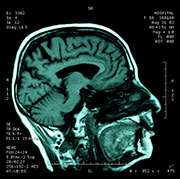Insulin increases resting-state functional connectivity in T2DM

(HealthDay)—For older adults with type 2 diabetes, a single dose of intranasal insulin increases resting-state brain functional connectivity, according to a study published online Sept. 23 in Diabetes.
Hui Zhang, from Peking University in Beijing, and colleagues examined the impact of a single dose of intranasal insulin on resting-state brain functional connectivity in older adults with type 2 diabetes. The impact of a single dose of insulin or saline was examined in 14 adults with diabetes and 14 controls. Functional magnetic resonance imaging was used to quantify resting-state functional connectivity between the hippocampal region and default mode network (DMN).
The researchers found that patients with diabetes demonstrated increased resting-state connectivity between the hippocampal regions and the medio-frontal cortex (MFC) and other DMN regions following insulin versus placebo administration. Compared with controls, the diabetes group had lower connectivity between the hippocampal region and the MFC on placebo administration, but demonstrated MFC connectivity similar to that of controls on insulin administration.
"A single dose of intranasal insulin increases resting-state functional connectivity between the hippocampal regions and multiple DMN regions in older adults with type 2 diabetes," the authors write. "Intranasal insulin administration may modify functional connectivity among brain regions regulating memory and complex cognitive behaviors."
More information:
Abstract
Full Text (subscription or payment may be required)
Copyright © 2014 HealthDay. All rights reserved.

















